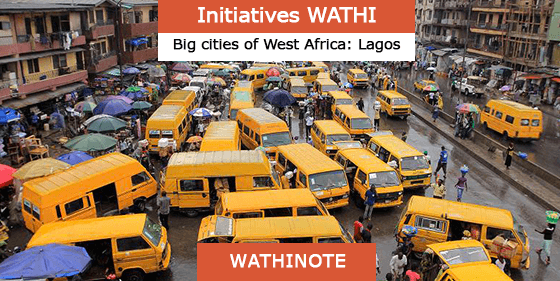

Author (s): Kingsley Ighobor
Affiliated Institution: Africa Renewal
Type of Publication: Article
Date of Publication: April 2016
An oft-told tale of Lagos’s once-notorious traffic jams is that of a taxi passenger stuck in a snarl-up who left the vehicle, wandered into a roadside restaurant to eat, drank a beer, took a nap and returned to the vehicle that had not moved an inch. He reached his destination several hours later.
First-time visitors to Lagos about 10 years ago were warned, “This is Lagos.” That meant that you should not expect help from anyone but brace up for hard times ahead.
Fast-forward to 2016 and the traffic congestion, high crime rate, clogged gutters and roads filled with garbage could soon become just a bad dream. These days Lagosians still regale each other with anecdotes of the dystopian city even as positive changes can be seen in Africa’s most populous city, with 21 million people. These days the greeting “Welcome to Lagos” portends better news.
Transformation foundation
The transformation of Lagos started during the tenure of Bola Tinubu, Lagos State governor from 1999 to 2007. Mr. Tinubu set forth a rescue operation that his successor, Babatunde Fashola, later continued.
There were political and economic benefits for such efforts. “Lagos is Nigeria’s richest state, producing about $90 billion a year in goods and services, making its economy bigger than that of most African countries, including Ghana and Kenya,” notes the Economist.
A fast-growing population (600,000 people added annually), without commensurate improvements in social services such as housing, water and transportation, had pushed Lagos to the cliff’s edge.
“Manhattan” rises offshore
There have been impressive infrastructural developments, but the plan to create a “new city” at the edge of Lagos is probably the most audacious. Dubbed the “Manhattan of Africa,” Eko Atlantic on Victoria Island consists of 10 million square meters of land reclaimed from the ocean and protected by an 8.5 km seawall. Construction began in 2008, and it consists of seven districts along the oceanfront, including a business district that is expected to host major banks and insurance and oil companies, as well as the Nigerian stock exchange, once construction is fully completed.
“Lagos is Nigeria’s richest state, producing about $90 billion a year in goods and services, making its economy bigger than that of most African countries, including Ghana and Kenya,” notes the Economist
Lagos’s government reduced crime rates by providing logistical support to the police force run by the federal government. It installed closed-circuit television in most parts of the city and established skills acquisition programmes for the “area boys” youths, mostly jobless, who extort money from drivers and passengers. It also set up mobile courts to summarily try cases.
Lagos is becoming a clean city. Thousands of workers can be seen late every night sweeping the roads and taking away the dirt. An efficient garbage collection service supports the cleaning efforts. More than one million tons of waste was deposited in public landfills in 2015, up from 71,000 tons in 2004. About 72% of Lagos residents currently use a government-regulated waste disposal service; in 2005 only 42% used such a service.
Lagos’s government reduced crime rates by providing logistical support to the police force run by the federal government
Nigerians are generally in disbelief regarding the new Lagos. “This is not the Lagos I used to know,” says Sanusi Turay, who manages a private security firm in the city. The new Lagos is a bit of an anomaly, Mr. Turay explains, with a tinge of sarcasm. “But, honestly, we are very happy things are changing for the better.”
Fashola’s strategy
After Mr. Tinubu exited, Mr. Fashola’s strategy was focused on three fronts. First, he solicited citizens’ support for a new vision of Lagos. The slogan Eko o ni baje (Lagos must not spoil) rallied Lagosians against the status quo. Second, he reformed the tax system, which resulted in an increase in tax revenues to $115 million per month in 2015, up from $3.2 million in 1999. Tax compliance increased to 80%, up from about 30% in 2005. Third, Mr. Fashola used the tax revenues to undertake ambitious transportation and sanitation projects, including the creation of a rail network, bus lanes and a waste collection system, as well as massive road rehabilitation.
Nigerians are generally in disbelief regarding the new Lagos. “This is not the Lagos I used to know,” says Sanusi Turay, who manages a private security firm in the city
Under the Bus Rapid Transit (BRT) system, Lagos transportation “became faster, safer, predictable, relatively cheaper and more comfortable,” reported Vanguard. The BRT itself created jobs for 2,500 people. Most of Lagos’ notoriously old and dangerous commercial buses, called Molues, were replaced by swanky new ones that use designated bus lanes. With support of private operators, the government procured about 1,300 taxicabs to run in the city.
Les Wathinotes sont soit des résumés de publications sélectionnées par WATHI, conformes aux résumés originaux, soit des versions modifiées des résumés originaux, soit des extraits choisis par WATHI compte tenu de leur pertinence par rapport au thème du Débat. Lorsque les publications et leurs résumés ne sont disponibles qu’en français ou en anglais, WATHI se charge de la traduction des extraits choisis dans l’autre langue. Toutes les Wathinotes renvoient aux publications originales et intégrales qui ne sont pas hébergées par le site de WATHI, et sont destinées à promouvoir la lecture de ces documents, fruit du travail de recherche d’universitaires et d’experts.
The Wathinotes are either original abstracts of publications selected by WATHI, modified original summaries or publication quotes selected for their relevance for the theme of the Debate. When publications and abstracts are only available either in French or in English, the translation is done by WATHI. All the Wathinotes link to the original and integral publications that are not hosted on the WATHI website. WATHI participates to the promotion of these documents that have been written by university professors and experts.
